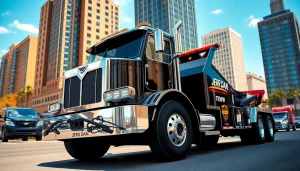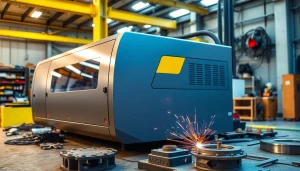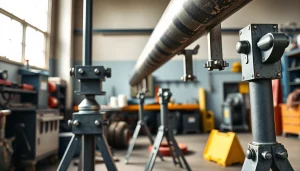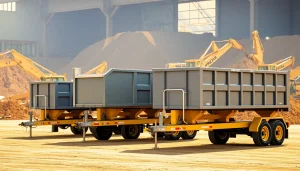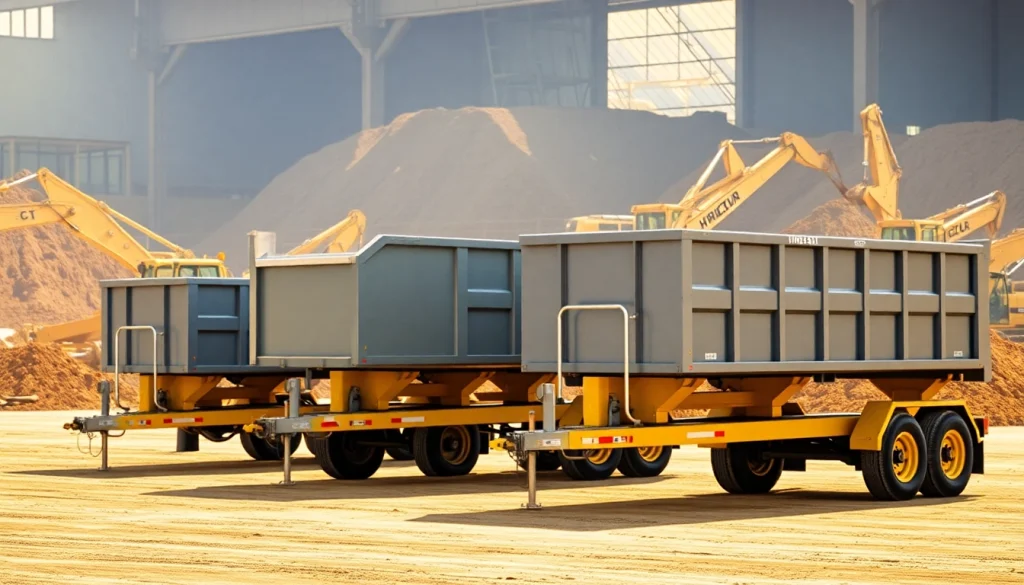
Understanding Hydraulic Dump Trailers for Sale
What are Hydraulic Dump Trailers?
Hydraulic dump trailers are specialized vehicles designed to haul various materials, ranging from construction debris to agricultural produce. They are equipped with hydraulic systems that enable the dumping of materials with ease and efficiency. This mechanism typically relies on hydraulic lift cylinders that raise the trailer bed, allowing the contents to slide out seamlessly. This functionality is crucial for construction sites, landscaping tasks, and other heavy-duty operations where efficiency is paramount. Whether you’re transporting dirt, gravel, or other heavy materials, hydraulic dump trailers for sale provide the versatility and power required for the job.
Common Applications for Hydraulic Dump Trailers
Hydraulic dump trailers serve a wide range of applications across various industries. Here are some common uses:
- Construction: These trailers are essential for transporting heavy materials like sand, gravel, and dirt to construction sites. Their ability to unload quickly streamlines the workflow on busy job sites.
- Landscaping: Landscape professionals utilize dump trailers to haul soil, mulch, and plants, making it easier to complete tearing out old gardens or establishing new ones.
- Agriculture: Farmers employ hydraulic dump trailers for transporting feed, equipment, and harvested crops, contributing significantly to the efficiency of farming operations.
- Waste Management: In waste management, these trailers facilitate the transportation of debris and refuse from projects or locations.
Benefits of Using Hydraulic Dump Trailers
The advantages of hydraulic dump trailers are numerous, making them a valuable investment for those in need:
- Efficiency: The hydraulic lifting mechanism significantly reduces labor time, allowing operators to unload materials quickly and safely.
- Strength: Built with durable materials, hydraulic dump trailers are designed to withstand heavy abuse and prolonged use, ensuring reliability.
- Versatility: These trailers can transport various types of loads, from loose material to heavy equipment, adjusting to different tasks and industries.
- Safety: The hydraulic system minimizes manual handling, reducing the risk of injury associated with lifting heavy loads manually.
Key Features to Look for in Hydraulic Dump Trailers for Sale
Hydraulic Systems Explained
The heart of any hydraulic dump trailer is its hydraulic system. This system typically consists of a hydraulic pump, cylinders, hoses, and a reservoir fluid. When selecting a hydraulic dump trailer, understand the following:
- Pump Type: Choose between electric and manual pumps based on your specific needs. Electric pumps provide ease of use, while manual pumps can be more reliable in remote locations.
- Cylinder Size: The size and strength of hydraulic cylinders determine how much weight a trailer can lift. Larger cylinders can usually handle heavier loads.
- Functionality: Look for systems that offer multiple dumping angles and speeds, ensuring you can tackle any loading and unloading scenario.
Construction and Durability Aspects
When purchasing a hydraulic dump trailer, don’t overlook the construction quality. Here are essential features to consider:
- Frame Material: Most trailers are made of either steel or aluminum. Steel is generally more durable and better suited for heavy loads, while aluminum is lighter and rust-resistant.
- Welding Quality: Inspect the welding quality on the joints and seams. High-quality welding ensures structural integrity and longevity.
- Flooring Material: The floor should be reinforced to handle heavy loads without bending or breaking, and options may include wood, steel, or composite materials.
Size, Capacity, and Customization Options
Sizing is crucial when choosing a hydraulic dump trailer. It’s essential to consider:
- Load Capacity: Trailers come in various load capacities, typically ranging from 5,000 lbs to over 20,000 lbs. Ensure you select one that meets your hauling requirements.
- Dimensions: The size of the dump area matters. Longer trailers allow for maximum material transport, while shorter models are more maneuverable in tight spaces.
- Customization: Consider trailers that can be customized with additional features such as reinforced beds, removable sides, or specific hitch options.
Comparative Analysis of Hydraulic Dump Trailers for Sale
New vs. Used Hydraulic Dump Trailers
When deciding between new and used hydraulic dump trailers, considerations include:
- Condition: New trailers offer the latest technologies and warranties, while used trailers may provide greater cost savings but could come with potential hidden issues.
- Price: New models will be more expensive, but financing options may be available. Used trailers are generally cheaper but require more thorough inspections to ensure reliability.
- Resale Value: New trailers depreciate faster than used ones, which could lead to better options for resale if you plan to upgrade in future.
Different Brands and Models Comparison
When comparing brands and models, research is vital. Here are pointers for effective evaluation:
- Brand Reputation: Established brands often have better customer support and warranty services, which is crucial for maintenance.
- Model Specifications: Each model will have unique specifications regarding size, weight capacity, and hydraulic lift capabilities. Compare these to find the best fit for your needs.
- User Reviews: Checking reviews from other users can provide insights into performance, durability, and customer service experiences.
Cost Considerations and Value for Money
Cost should not be the only guiding factor in purchasing a hydraulic dump trailer. Consider:
- Initial Cost vs. Long-Term Savings: Investing in a higher-quality trailer may result in lower maintenance costs and increased longevity.
- Operating Expenses: Account for any operational costs associated with the trailer, such as maintenance, repairs, and modifications.
- Financing Options: Explore financing if the upfront cost is a concern. Look for reasonable interest rates and repayment plans that fit your budget.
Choosing the Right Hydraulic Dump Trailer for Your Needs
Assessing Your Requirements
Assess your needs thoroughly to select the right hydraulic dump trailer:
- Frequency of Use: Consider how often you will use the trailer. If it’s for a one-time project, a cheaper model may suffice, but for continuous commercial use, invest in a robust unit.
- Types of Materials: Identify the materials you’ll typically transport. The weight and nature of these materials will dictate the type of trailer and features necessary.
- Usage Environment: Will you be using the trailer on rough terrain or smooth roads? Some trailers are better suited for off-road conditions than others.
Consulting Experts and Gathering Reviews
Leverage expert advice when navigating your purchase:
- Industry Experts: Consult with industry professionals or representatives who can provide valuable insights on the latest models and technologies available.
- User Forums: Engage in forums or social media groups where experienced users share tips on what to look for and what to avoid.
- Local Dealer Visits: Consider visiting local dealers to see the models in-person, which can help you better assess their features and build quality.
Financing Options for Your Purchase
Financing a hydraulic dump trailer can open doors for numerous buyers. Here are various options to consider:
- Bank Loans: Traditional bank loans usually offer competitive rates but require good credit. Check various lenders for the best option.
- Dealership Financing: Some dealers provide in-house financing, simplifying the process. Always compare interest rates to ensure favorable terms.
- Leasing Options: If you anticipate using a trailer temporarily, consider leasing as a more affordable alternative.
Maintenance Tips for Hydraulic Dump Trailers
Regular Maintenance Practices
To keep your hydraulic dump trailer operating optimally, regularly perform the following maintenance tasks:
- Hydraulic Fluid Checks: Regularly check fluid levels and quality to ensure the hydraulic system functions effectively.
- Tire Maintenance: Inspect tire pressure and condition. Maintaining proper pressure improves handling and extends tire life.
- Frame and Body Inspection: Periodically examine the frame for signs of rust or damage, addressing any issues promptly to prevent deterioration.
Troubleshooting Common Issues
Even with diligent maintenance, problems can occur. Here are some common issues and how you can troubleshoot them:
- Hydraulic Lift Failure: If the hydraulic lift isn’t working, check for fluid leaks, air trapped in the system, or damaged components.
- Steering Issues: If the trailer is unstable or hard to control, inspect tire alignment and suspension for damage.
- Electrical Failures: For electric pumps, ensure there are no blown fuses or bad connections that could disrupt functionality.
When to Seek Professional Help
Some issues require professional intervention to resolve effectively. You should seek help when:
- Complex Repairs: Issues beyond basic maintenance should be handled by professionals, particularly hydraulic system repairs that require specialized knowledge.
- Safety Concerns: If you notice any safety concerns or irregularities in performance, don’t hesitate to consult a professional.
- Schedule Servicing: Regular servicing by experts can extend the life of the trailer and ensure it operates safely and efficiently.
